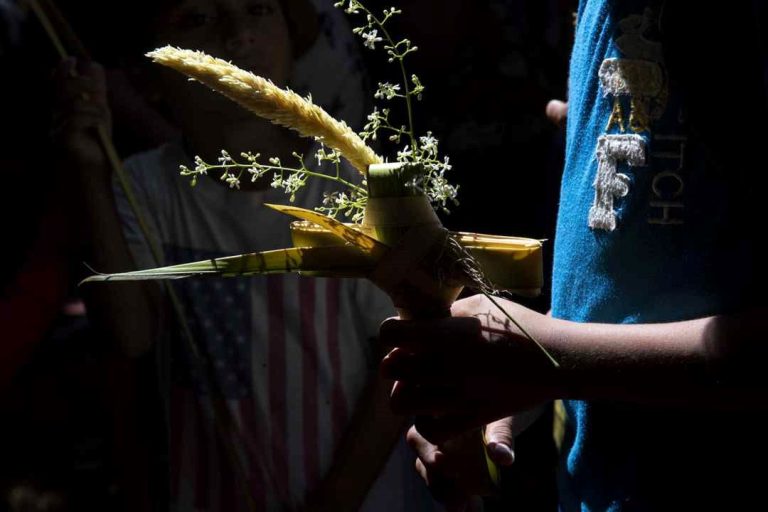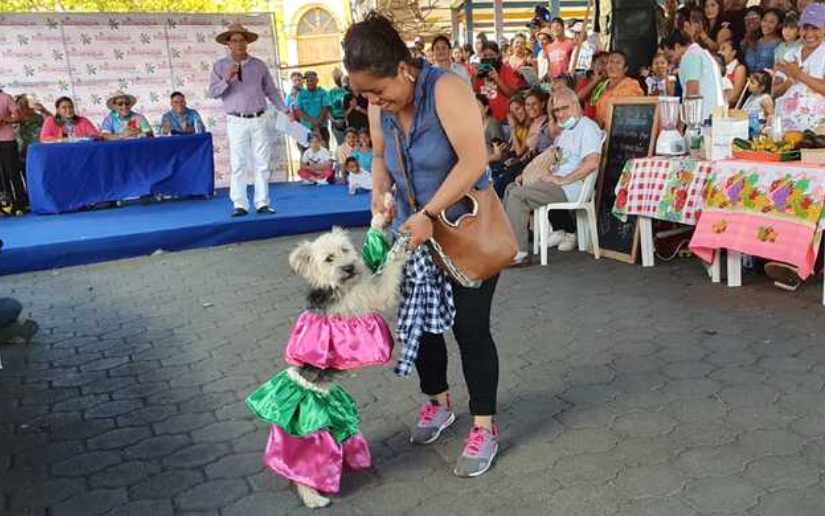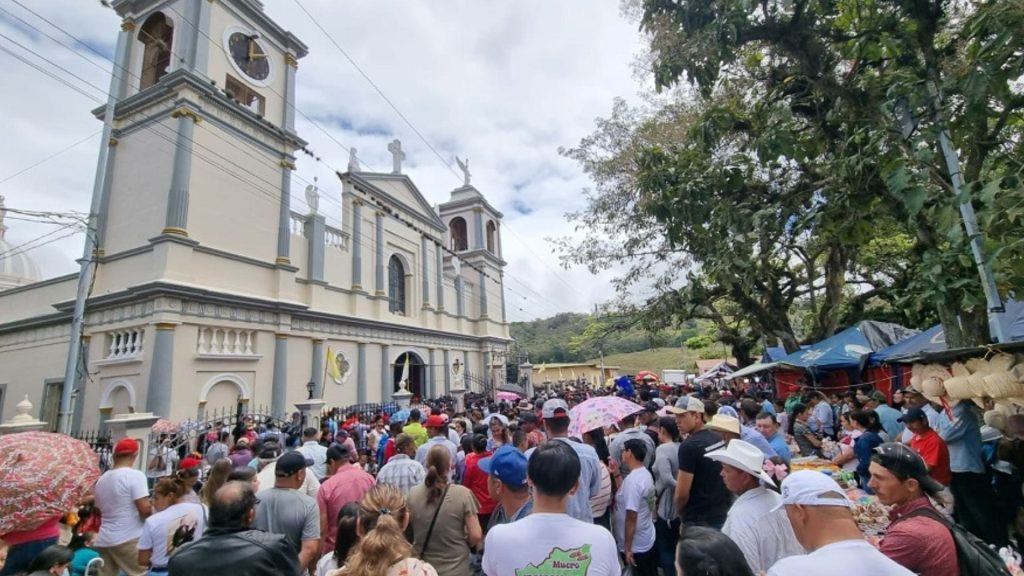5 de abril 2023

Ortega Grants Chinese Company a Huge Mining Concession

PUBLICIDAD 1M
PUBLICIDAD 4D
PUBLICIDAD 5D
The dictatorship has banned more than 30 processions in the first months of 2023. Catholics will celebrate Holy Week under censorship, fear and police

Un niño sostiene una cruz de palma durante la misa del Domingo de Ramos, en la catedral de Managua. foto: EFE / Jorge Torres
The traditional procession of Jesús del Rescate in Popoyuapa, Rivas, did not take place on Friday of Sorrows. And on Palm Sunday, Catholics weren't able to participate in the "Procession of the Palms", the official inauguration of Holy Week, because the regime ordered the National Police to limit religious celebrations to inside churches in Nicaragua.
The dictatorship kicked off 2023 with the prohibition of emblematic processions for Catholics, such as that of Jesus of the Sacrament, which takes place every January 1. They then prevented local celebrations and, in mid-February, ordered that no one could walk the route of the penitential Stations of the Cross. The most recently canceled procession was that of Jesus del Triunfo, in León, confirmed last week by the bishop of that diocese, Socrates Sandigo, without any justification for the decision.
The researcher Martha Patricia Molina calculates that more than 30 processions have been canceled so far this year, although she clarifies this is "a conservative number", taking into account that just the Archdiocese of Managua alone administers 118 parishes in the provinces of Managua, Masaya and Carazo, and each one has its own celebrations, in addition to the traditions of Holy Week.
Catholic parishioners will experience this Holy Week of 2023 with mixed feelings. On the one hand, they are strengthened in their faith and on the other, they feel powerless in the face of the constant violations of their right to religious freedom.
"They are hurting the noblest feelings that Catholic Christian people have: their faith. And what saddens us the most is that they [Daniel Ortega and Rosario Murillo] talk about God, about Holy Week, and yet they are prohibiting all this," expressed indignantly the priest "Carlos", who asked that his real name not be used.
Ortega has intensified the persecution of the Church and imposed surveillance by police and regime operators in the different parishes of the country. Priests are having to cope in silence with sieges and threats, while in the Jorge Navarro Penitentiary System, known as "La Modelo", the bishop of Estelí, Monsignor Rolando José Álvarez, is serving an illegal sentence of 26 years and four months imposed by Ortega's judiciary, after refusing to be deported and banished.
"The pain the priest experiences of feeling powerless would be different if he had committed a crime, [but] this is all purely a whim. It is a way of [the dictator] saying: 'I'm the one in charge here, I am the one who decides, and whoever doesn't like it goes to jail or is followed by the police,'" laments Carlos.
The Nicaraguan Center for Human Rights (CENIDH) posted a video on its social media platforms, stating that "the prohibitions of Lent and Holy Week processions in Nicaragua are a flagrant violation of freedom of conscience, religion and freedom of expression."
The video goes on to explain that "The Ortega-Murillo regime not only wants to banish and strip people of their nationality, now it also is destroying what is most solemn and sacred of the people: their Christian faith and traditions, which are part of their identity."
Along with the prohibitions and abuses against the processions and clergy, the regime has tried to usurp the traditions of Holy Week with "tourist" activities of its own manufacture. This year, a dog parade in the Tiangue de Monimbó replaced the traditional procession of Saint Lazarus, which was always organized by the parish of Santa María de Magdalena in Masaya. Meanwhile, the parish priest of that church, Pedro Méndez, is being "protected" by authorities of the Archdiocese of Managua due to threats from the regime to imprison him.
Three days before the dog parade, during the night of March 23, several police patrols arrived at the parish house with the intention of arresting Father Méndez. The incident caused alarm among the inhabitants of Monimbó, and minutes later the vicar of Masaya, priest Bismark Conde, arrived and, after persuading the officers to not arrest him, took Father Méndez in his truck to "protect him".
The procession of San Lazaro has ancestral roots in the indigenous neighborhood of Monimbó. Dozens of people and their pets go to the temple on the fifth Sunday of Lent and, dressed in exotic costumes, participate in a procession to fulfill a promise to the popular saint. This colorful tradition has become a tourist attraction in the city. The regime has now taken this tradition and turned it into a cultural activity devoid of religiosity.
This year, more than 30 dogs paraded along a walkway installed by the Nicaraguan Tourism Institute, the Ministry of Family Economy, and the Masaya Mayor's Office.

Previously, a procession of horse-drawn carts decorated with the image of Jesús del Rescate started off on March 24 from the province of Masaya towards the National Sanctuary of Popoyuapa, in the province of Rivas. This was the same day the Catholic Church announced that the traditional procession of the Friday of Sorrows had been canceled for "reasons beyond our control". However, the pilgrim carts were able to travel smoothly to their destination.
The reason for this apparent normality is that the Masaya Mayor's Office and other municipalities controlled by the regime took over this Catholic tradition, delivered food packages to the devotees, and the Police –who normally harass Catholic churches and prohibit processions-- guarded the route.
"Maria" is part of a religious congregation in the north of the country. She nostalgically remembers Holy Week of 2022, when all the parish groups were finally able to gather after two difficult pandemic years. When they learned that this year they would not be able to have processions –which they consider "manifestations of faith"-- they were saddened, but now their community is convinced that one day they will be able to return to celebrate religious traditions in peace and above all "in freedom".
"Our priests have expressed the need for forgiveness, fasting, prayer. These are the three pillars with which we are celebrating Lent and which we are going to celebrate Holy Week", said María, who recognized that in the midst of all the intimidation against the Church, "the role of the priest is always the most difficult."
"There are many members [of the Church] who are Sandinistas. They themselves are the eyes, ears and mouths that transmit the sense of the Church," added María.
This kind of thing is happening not only in the north of the country. In the parishes of Managua there are also "government infiltrators" who monitor the priests' Eucharist. For Carlos, it is not easy to be a priest. The parishioners question the regime's decisions and he, as a spiritual guide, tries to reassure them, but he has his own struggles. During the Eucharist he has had to censor himself, and it is more of a challenge during Holy Week, when the Gospel recalls the injustices that Jesus Christ suffered at the hands of the Pharisees, a situation that "resembles what Monsignor Rolando Alvarez is going through".
The Nicaraguan government unilaterally suspended diplomatic relations with the Holy See in mid-March, after Pope Francis described the regime in Nicaragua as a "Hitlerian dictatorship", whose leader, Daniel Ortega –he commented "with much respect"-- suffers from "an imbalance". After the Holy Father's declarations, parishioners and priests expressed their fear of a new attack against the Church.
At the beginning of this year, Martha Patricia Molina said that 2023 would be "terrible" in terms of the repression against the Catholic Church. She also stressed that Ortega "has the heartless and illogical intention of eliminating the Catholic faith from the country because he knows that the Catholic Church is the only credible, respected and loved institution that in the light of the Gospel is announcing and denouncing all the arbitrary and evil actions committed by the dictatorship."
Molina, who is the author of the reports "Nicaragua: a persecuted church", stressed that the regime "has crossed all the lines" in its repressive escalation against the Church, including such actions of physical aggression as the acid attack on a priest, and an act of "terrorism", as Cardinal Leopoldo Brenes described the attack with an incendiary bomb on the image of the Blood of Christ in the cathedral of Managua.
In the past year, the regime expelled from the country the apostolic nuncio, Waldemar Stanislaw Sommertag; shut down Church organizations and media outlets; and besieged Catholic temples. Some 21 clergy members were banished, imprisoned, exiled and declared "traitors to the homeland".
"We are going through one of the crudest periods of religious persecution in the ecclesiastical history of Nicaragua," says a seminarian who asked to remain anonymous. He added: "The level of threats of all kinds, surveillance and blackmail of the Catholic Church are as never before".

Despite the regime's intention to take over Catholic traditions, it doesn't always achieve its goal. On Sunday, March 26, a tide of people arrived at the Sanctuary of Tepeyac, in the municipality of San Rafael del Norte, to commemorate the 33rd anniversary of the death of Father Odorico D'Andrea. The event caused astonishment because it occurred after the police of the dictatorship had prohibited the traditional mass, and the priest of the temple, Friar Damian Muratori, had been deported and imprisoned in Italy.
Days before the mass, which was initially scheduled for March 22, Jinotega Mayor Leónidas Centeno, Police Commissioner Marvin Castro, and other officials of the regime met with the bishop of Jinotega and president of the Episcopal Conference of Nicaragua, Monsignor Carlos Enrique Herrera, where they allegedly informed him of the decision to cancel the activity, according to a report by 100% Noticias.
Although the Church was forced to change its plans, the devotees of Father D'Andrea filled the Tepeyac sanctuary and the San Rafael Arcángel temple in San Rafael del Norte. But once the mass officiated by Monsignor Herrera was over, the people quickly left.
In its video, CENIDH highlights that "this year, without processions all over the country, Holy Week will be incomplete, mutilated. The presence of popular participation will be missing. But in the face of so much repression, the fervor of the people must resist and be strengthened".
"Sooner rather than later," the video continues, "Nicaraguans will once again be able to participate freely in their processions."
This article was originally published in Spanish in Confidencial and translated by our staff.
PUBLICIDAD 3M
Confidencial es un diario digital nicaragüense, de formato multimedia, fundado por Carlos F. Chamorro en junio de 1996. Inició como un semanario impreso y hoy es un medio de referencia regional con información, análisis, entrevistas, perfiles, reportajes e investigaciones sobre Nicaragua, informando desde el exilio por la persecución política de la dictadura de Daniel Ortega y Rosario Murillo.
PUBLICIDAD 3D